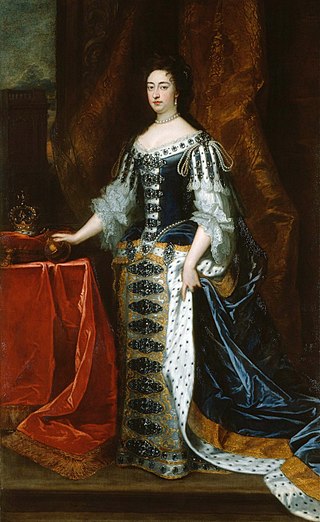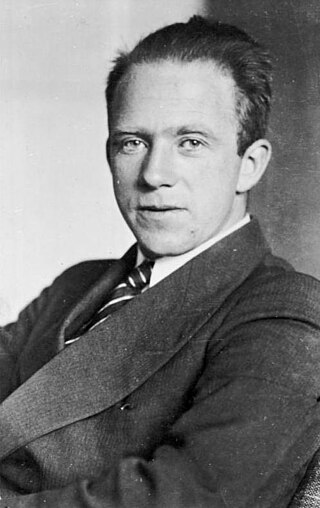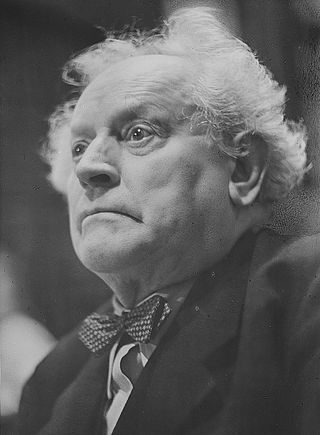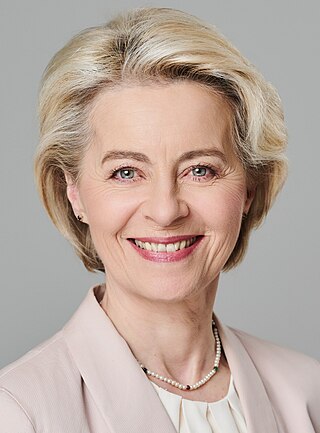
Johann Carl Friedrich Gauss was a German mathematician, astronomer, geodesist, and physicist who contributed to many fields in mathematics and science. He was director of the Göttingen Observatory and professor of astronomy from 1807 until his death in 1855.

Germany, officially the Federal Republic of Germany (FRG), is a country in Central Europe. It lies between the Baltic and North Sea to the north and the Alps to the south. Its sixteen constituent states have a total population of over 82 million in an area of 357,569 km2 (138,058 sq mi), making it the most populous member state of the European Union. It borders Denmark to the north, Poland and Czechia to the east, Austria and Switzerland to the south, and France, Luxembourg, Belgium, and the Netherlands to the west. The nation's capital and most populous city is Berlin and its main financial centre is Frankfurt; the largest urban area is the Ruhr.

German is a West Germanic language in the Indo-European language family, mainly spoken in Western and Central Europe. It is the most widely spoken and official or co-official language in Germany, Austria, Switzerland, Liechtenstein, and the Italian province of South Tyrol. It is also an official language of Luxembourg and Belgium, as well as a recognized national language in Namibia. There further exist notable German-speaking communities in France (Alsace), the Czech Republic, Poland, Slovakia, Denmark, Romania and Hungary (Sopron).

Mary II was Queen of England, Scotland, and Ireland, co-reigning with her husband, King William III and II, from 1689 until her death in 1694. She was also Princess of Orange following her marriage on 4 November 1677. Her joint reign with William over Britain is known as that of William and Mary.

Werner Karl Heisenberg was a German theoretical physicist, one of the main pioneers of the theory of quantum mechanics, and a principal scientist in the Nazi nuclear weapons program during World War II. He published his Umdeutung paper in 1925, a major reinterpretation of old quantum theory. In the subsequent series of papers with Max Born and Pascual Jordan, during the same year, his matrix formulation of quantum mechanics was substantially elaborated. He is known for the uncertainty principle, which he published in 1927. Heisenberg was awarded the 1932 Nobel Prize in Physics "for the creation of quantum mechanics".

George II was King of Great Britain and Ireland, Duke of Brunswick-Lüneburg (Hanover) and a prince-elector of the Holy Roman Empire from 11 June 1727 (O.S.) until his death in 1760.

William III, also known as William of Orange, was the sovereign Prince of Orange from birth, Stadtholder of Holland, Zeeland, Utrecht, Guelders, and Overijssel in the Dutch Republic from the 1670s, and King of England, Ireland, and Scotland from 1689 until his death in 1702. As King of Scotland, he is known as William II. He ruled Great Britain and Ireland with his wife, Queen Mary II, and their joint reign is known as that of William and Mary.

In molecular physics and chemistry, the van der Waals force is a distance-dependent interaction between atoms or molecules. Unlike ionic or covalent bonds, these attractions do not result from a chemical electronic bond; they are comparatively weak and therefore more susceptible to disturbance. The van der Waals force quickly vanishes at longer distances between interacting molecules.

Rosemarie Magdalena Albach, known professionally as Romy Schneider, was a German-French actress. She is regarded as one of the greatest screen actresses of all time and became a cult figure due to her role as Empress Elisabeth of Austria in the Sissi trilogy in the mid-1950s. She later reprised the role in a more mature version in Luchino Visconti's Ludwig (1973). She began her career in the German Heimatfilm genre in the early 1950s when she was 15. Schneider moved to France, where she made successful and critically acclaimed films with some of the most notable film directors of that era. Her performance in That Most Important Thing: Love is regarded as one of the greatest in the history of cinema. Coco Chanel called Romy “the ultimate incarnation of the ideal woman.” Bertrand Tavernier remarked: “Sautet is talking about Mozart with regard to Romy. Me, I want to talk of Verdi, Mahler…”

Der Spiegel is a German weekly news magazine published in Hamburg. With a weekly circulation of about 724,000 copies in 2022, it is one of the largest such publications in Europe. It was founded in 1947 by John Seymour Chaloner, a British army officer, and Rudolf Augstein, a former Wehrmacht radio operator who was recognized in 2000 by the International Press Institute as one of the fifty World Press Freedom Heroes.

The Austrian Empire, officially known as the Empire of Austria, was a multinational European great power from 1804 to 1867, created by proclamation out of the realms of the Habsburgs. During its existence, it was the third most populous monarchy in Europe after the Russian Empire and the United Kingdom, while geographically, it was the third-largest empire in Europe after the Russian Empire and the First French Empire.

Martin Andersen Nexø was a Danish writer. He was one of the authors in the Modern Breakthrough movement in Danish art and literature. He was a socialist throughout his life and during the Second World War moved to the Soviet Union, and afterwards to Dresden in East Germany.

Edwin van der Sar is a Dutch football executive and former professional player who was most recently the chief executive of Ajax, with whom he began his senior playing career in the early 1990s; he is considered to be a member of the club's golden generation and was part of the Ajax team that won the UEFA Champions League in 1995. A goalkeeper, he left Ajax for Juventus in 1999, where he spent two years before moving to England, first to Fulham and then to Manchester United in 2005. There he won a second Champions League title in 2008, making him one of just eight players at the time to have won the competition with more than one club. He retired as a professional in 2011, but briefly came out of retirement in 2016 to play a match for Dutch amateur team VV Noordwijk, for whom he had previously played as a youth. He played 130 times for the Netherlands national team, and was the nation's most-capped player until 2017, when he was overtaken by Wesley Sneijder.

Ursula Gertrud von der Leyen is a German politician, serving as the 13th president of the European Commission since 2019. She served in the German federal government between 2005 and 2019, holding positions in Angela Merkel's cabinet, most recently as federal minister of defence. She is a member of the centre-right Christian Democratic Union (CDU) and its affiliated europarty, the European People's Party (EPP). On 7 March 2024, the EPP elected her as its Spitzenkandidat to lead the campaign for the 2024 European parliament elections. She was re-elected to head the Commission in July 2024.

Grimms' Fairy Tales, originally known as the Children's and Household Tales, is a German collection of fairy tales by the Brothers Grimm, Jacob and Wilhelm, first published on 20 December 1812. Vol. 1 of the first edition contained 86 stories, which were followed by 70 more tales, numbered consecutively, in the 1st edition, Vol. 2, in 1815. By the seventh edition in 1857, the corpus of tales had expanded to 200 tales and 10 "Children's Legends". It is listed by UNESCO in its Memory of the World Registry.

Natalee Ann Holloway was an 18-year-old American high school graduate from Mountain Brook, Alabama, who disappeared from the Caribbean island of Aruba on May 30, 2005. Her disappearance resulted in an international media sensation, especially in the United States. The prime suspect, Dutch national Joran van der Sloot, has made conflicting statements over the years about his involvement, including a confession to killing her. Holloway's remains have not been found.

Günther Simon was an East German actor.

1. Fußballclub Union Berlin e. V., commonly known as Union Berlin, is a professional German football club based in Köpenick, Berlin.
Andre Asriel was an Austrian-German composer.

















